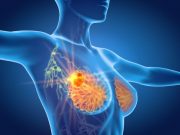Tag: Cancer: Breast
Women May Not Recognize Non-Lump Symptoms of Breast Cancer
Fewer than half of survey respondents could identify lesser-known symptoms
Breast Satisfaction Increased for Women Undergoing Autologous Reconstruction
Higher levels of breast satisfaction and psychosocial and sexual well-being reported compared with alloplastic breast reconstruction
ASTRO: Hypofractionation Effective for Radiotherapy After Breast Reconstruction
Use of hypofractionation is as effective as conventionally fractionated RT for women undergoing reconstruction after mastectomy
Subsequent Breast Cancer Risk Higher for Child Cancer Survivors Receiving Doxorubicin
More than twofold increase in risk seen for those treated with ≥200 mg/m² cumulative doxorubicin versus no doxorubicin
Use of AI Plus One Radiologist Noninferior for Detecting Breast Cancer
Double reading by one radiologist plus AI noninferior to standard-of-care double reading by two radiologists
Diet, Exercise Intervention May Aid Chemotherapy Outcomes in Breast Cancer
Although relative dose intensity similar, pathologic complete response higher with intervention
Interventions Can Increase Adjuvant Endocrine Treatment Adherence
Findings based on meta-analysis involving more than 360,000 breast cancer survivors
Fine Particular Matter Linked to Increase in Breast Cancer Risk
Significant increase in risk seen for ER-positive breast cancer, but not ER-negative tumors
Combined AI, Mammography Texture Model Improves Breast CA Risk Prediction
Combination model achieved higher AUC for interval and long-term cancers grouped together
Common Cancer Screenings May Not Extend Life Longevity
Meta-analysis only shows a 110-day survival benefit for colorectal cancer screening with sigmoidoscopy














